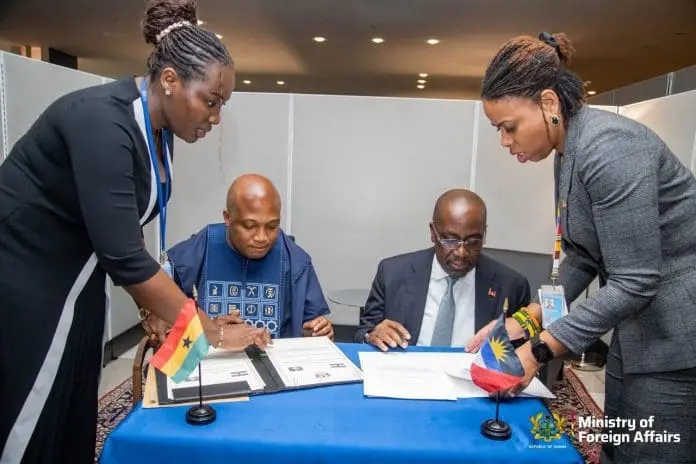By Ghana News
Copyright ghanamma

Ghana’s Minister for Foreign Affairs, Samuel Okudzeto Ablakwa, has secured a visa waiver agreement with Antigua and Barbuda, marking the tenth such diplomatic achievement since the Mahama Administration took office in January 2025.
The agreement was announced Wednesday evening through Ablakwa’s social media channels, with the Minister revealing that the deal was “signed in the margins of the United Nations General Assembly.”
The Foreign Affairs Minister expressed gratitude to his Caribbean counterpart, acknowledging “H.E. E.P. Chet Greene, Minister for Foreign Affairs, Trade and Barbuda Affairs for his remarkable contribution to this milestone.”
The achievement builds on Ghana’s recent diplomatic successes, with previous agreements secured with Morocco, Mozambique, Colombia, São Tomé and Príncipe, Dominica, Serbia, Algeria, and Angola since President John Dramani Mahama returned to power.
Ablakwa emphasized the broader strategic vision behind these diplomatic initiatives, stating that “The Mahama Administration is deliberate about adding more value to the Ghanaian Passport, projecting our image in the comity of nations and enhancing the travel experience of Ghanaians as we boost trade, tourism, and in this particular instance connect us to our brothers and sisters in the Caribbean.”
The North Tongu Member of Parliament (MP), who was appointed Foreign Affairs Minister in January 2025, has prioritized visa liberalization as a cornerstone of Ghana’s diplomatic engagement under the new administration.
The Antigua and Barbuda agreement represents Ghana’s first visa waiver deal with an Eastern Caribbean nation, expanding the country’s diplomatic footprint in a region with significant historical and cultural ties to Ghana through the African diaspora.
The newly secured agreement follows Parliament’s recent ratification of visa waiver deals with four countries – São Tomé and Príncipe, Colombia, Dominica, and Mozambique – bringing the total number of finalized agreements in 2025 to five, with Morocco being the first secured under the current administration.
These diplomatic achievements contribute to enhancing Ghana’s passport strength, which currently provides visa-free or visa-on-arrival access to 67 countries and territories, ranking 71st globally according to the Henley Passport Index.
The timing of the announcement during the United Nations General Assembly (UNGA) session demonstrates Ghana’s strategic approach to multilateral diplomacy, utilizing international forums to advance bilateral relationships and secure tangible benefits for citizens.
Ablakwa’s diplomatic successes align with the Mahama Administration’s broader foreign policy objectives of strengthening Ghana’s international partnerships while delivering practical benefits to ordinary Ghanaians seeking enhanced travel mobility.
The Foreign Affairs Minister has implemented several policy reforms since taking office, including recent visa restrictions on Chinese nationals aimed at curbing illegal mining activities, demonstrating a balanced approach to immigration policy that considers both opportunities and security concerns.
The Caribbean connection holds particular significance for Ghana, given the historical links between the two regions through the transatlantic slave trade and subsequent cultural exchanges. The agreement opens new possibilities for educational exchanges, tourism, and business partnerships.
Industry observers expect the visa waiver agreements to stimulate increased business travel and tourism between Ghana and partner countries, potentially generating economic benefits beyond the immediate convenience for travelers.
The systematic approach to securing these agreements reflects Ghana’s renewed diplomatic strategy under the current administration, with negotiations reportedly ongoing with additional countries across multiple continents.
The success rate of ten agreements within nine months of taking office positions Ablakwa among Ghana’s most productive Foreign Affairs Ministers in terms of visa liberalization achievements, setting new benchmarks for diplomatic effectiveness.
Future negotiations may focus on expanding agreements to include other Caribbean Community (CARICOM) nations, potentially creating a broader framework for Ghana-Caribbean cooperation across multiple sectors including trade, education, and cultural exchange.



